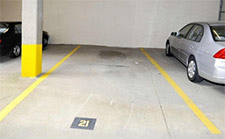 *Unpublished Opinion
*Unpublished Opinion
Homeowners Association (“HOA”) Boards of Directors and management professionals often encounter disputes with homeowners as to who has the right to use common areas parking spaces within a condominium development. Homeowners often believe that such spaces are part of their separately owned units (their separate property or “separate interest”); that the spaces were “deeded” to them and the HOA is therefore is limited in its ability to regulate, restrict, or reassign the use of those spaces. For most condominium projects, parking spaces are portions of common area which the HOA may—or in some instances must—reserve for a particular homeowner’s exclusive use, based upon the language of the HOA’s governing documents (i.e., the language of its CC&Rs and/or condominium plan).
We have seen instances where the deed to a unit that was conveyed to the homeowner by the initial developer of the HOA does include a reference to a particular common area parking space as assigned to the homeowner for her exclusive use. However, such deeds often parallel language in the HOA’s CC&Rs and/or condominium plan which support that exclusive use assignment. In other words, the language of the deed merely reiterates the applicable language of the CC&Rs and/or condominium plan establishing a particular parking space as a portion of common area for which the homeowner listed in the deed has exclusive use easement rights.
The situation becomes more complicated when the exclusive use language in the deed is ambiguous or is not supported by any provisions of the HOA’s governing documents. This was the central issue in Michaelson v. V.P. Condominium Corporation, No. D071215 (Cal. Ct. App. Feb. 21, 2018). The HOA in Michaelson consisted of an eleven (11) unit condominium development, in which each unit was granted an exclusive right to use an assigned garage parking space as defined in the HOA’s condominium plan. However, the condominium plan also denoted a 12th unassigned garage parking space (“Unassigned Space”). For some reason, the right to use this Unassigned Space was actually listed in the deed (“Deed”) to a unit (“Unit”) that the HOA’s developer conveyed to the first homeowner of the Unit, which was later conveyed to the Plaintiff homeowner (“Homeowner”).
The HOA accused the Homeowner of fraudulently acquiring the Unassigned Space and demanded that he convey his interest in the Unassigned Space to the HOA. The Homeowner sued the HOA to quiet title on the Unassigned Space based on the following: (1) the Deed included the exclusive right to use the Unassigned Space; or in the alternative, (2) the Unassigned Space was acquired by adverse possession.
The Court quickly disposed of the Homeowner’s adverse possession claim because the tax for the Unassigned Space was paid for by all the HOA’s members and not by the Homeowner (one of the elements for an adverse possession claim in California requires claimant to have paid taxes on the property; See Code Civ. Pro § 325; See also Nellie Gail Ranch Owners Assn. v. McMullin (2016) 4 Cal. App. 5th 982).
With regard to the Deed, the Court found that it was ineffective as to the right of exclusive use of the Unassigned Space despite the fact that the HOA’s CC&Rs specified garage spaces as part of the “exclusive use common area.” This is because the CC&Rs tied the definition of exclusive use common area to the condominium plan, and the condominium plan did not define the Unassigned Space as exclusive use common area. The Court therefore held that the Unassigned Space belonged to the HOA as general common area, and as such the CC&Rs prohibit the transfer of the Unassigned Space without consent of 75% of the eligible mortgagees on the units.
The Court of Appeal affirmed the trial court’s order to grant the HOA’s motion for summary judgment plus attorney’s fees, holding that the Deed was a “wild deed” with ineffective conveyances that conflicted with the reservations contained in the CC&Rs and the condominium plan.
| This case highlights the often forgotten importance of condominium plans. While CC&Rs will answer most questions regarding ownership and use rights, the CC&Rs for condominium projects will often relate to and reference the development’s condominium plan in significant ways. |
-Blog post authored by TLG Attorney, Andrew M. Jun, Esq.
 HOA Lawyer Blog
HOA Lawyer Blog

